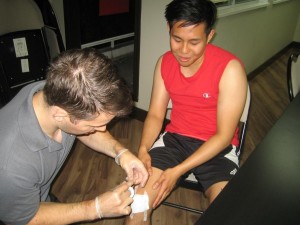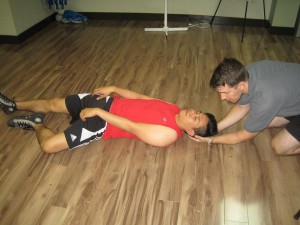
Toronto First Aid has been serving the Toronto area since 2008 and has become the premier St Mark James first aid provider in the area. Prospective trainees can enrol in a number of courses including standard, emergency, babysitting, and childcare first aid. Standard first aid and CPR training courses are the most popular programs and participants can opt to have the course partnered with three different CPR levels. Stand-alone CPR and AED training is offered in three level’s: “A”, “HCP” and “C”. Re-certifications courses are also available for participants that have valid St Mark James certificate. Contact this provider or the workplace approved to determine whether you meet the requirements for a re-certification course. Registration for training can be completed via telephone, email or on-line registration.
Visit the Toronto First Aid website by clicking this link.
Click Here to Register for a Course in Toronto NowToronto First Aid also offers a variety of programs, from re-certification courses to pet first aid. Groups, companies and businesses can also book private training programs in which an instructor can come to you or a private course can be held at the Toronto First Aid training centre. For more information or to book a private course use the contact information posted above.
Top Reasons Why Toronto First Aid is The Best Training Service Provider in The Area
- Toronto First Aid offers the most competitive training course rates in the area. Rates are the lowest compared to other service providers, and are inclusive of taxes, certificates, and workplace approved registration fees. Training manuals and equipment are also included in the initial enrolment fee, so trainees don’t have to worry about additional expenses.
- Full refunds are given to trainees who choose to drop out, as long as they provide a 72-hour notice beforehand.
- Toronto First Aid offers the largest number of training courses and extra classes at various schedules throughout the week, with certain course available during the weekends.
- All training courses are taught by workplace approved certified instructors who are the best in their given fields of expertise.
- Trainees who are able to complete a training course will receive a workplace approved certificate for first aid, CPR, and AED training, valid for three years throughout Canada.
- Toronto First Aid training facilities are well-maintained, with spacious and air-conditioned classrooms. The centers are equipped with the latest technology used in first aid and CPR training.
- Enrolment is quick and easy. Prospective trainees may complete their enrolment with the on-line application form below. E-mails, telephone calls, and walk-ins at the training center are also highly encouraged by Toronto First Aid.
What CPR Training Is Available?
CPR and AED training courses are divided into three levels: “A”, “C”, and “HCP”. AEDs are machines that are able to detect heart rhythms and apply needed shock during resuscitation.
Training classes use the 2010 Basic Life Support (BLS) guidelines made by the American Heart Association as guide in teaching the CPR and AED pathway. Recent studies show that there is an increase in survival rates with immediate chest compressions within the fist 3-5 minutes after collapse. This is part of the latest BLS guidelines taught in all CPR training levels.
A course that is unique to this provider is private infant CPR training. In this course participants will have an instructor come to them and teach infant CPR rescue skills for 1.5 to 2 hours. This course is designed for new and expecting parents that want to be prepared for almost any emergency. This course is great for parents who have hectic schedules and want a class in the comfort of their own homes.
Basic First Aid
Basic first aid classes are focused on first aid skill development for a variety of health emergencies. One of the topics covered in two-day comprehensive training programs is seizure management. Seizures are caused by uncontrollable electrical impulses in the brain that can manifest as physical tics such as lip smacking or repetitive hand movements to grand mal seizure activity. Knowing how to prevent the victim from injuring himself and safety precautions for the victim and rescuer are taught in this class.

Safety management during the seizure
- Free the area around the victim from objects that can cause injury
- Turn the victim to his side to prevent possible aspiration of vomitus and to keep the tongue from blocking the airway
- Place something underneath the victim’s head, such as a pillow or rolled towel or cloth
- Do not place anything into the victim’s mouth
- Do not restrain the victim
- Loosen the victims clothes, especially around the neck area
- Keep siderails up and a suction machine on stand-by (if in the hospital)
To learn more about safety management during seizure episodes, enrol in training course with Toronto First Aid today!
What Type of First Aid Classes Are Available?
Participants that want to enrol in a course with this provider will have the opportunity to select from the following courses.
Standard first aid, CPR and AED – This two day comprehensive course covers over a dozen first aid emergencies and includes CPR and AED training. Participants will learn about circulatory emergencies, respiratory emergencies, wound management, skeletal injuries, bruises, broken bones, fractures, seizures, poisonings, heat stroke, heat exhaustion, hypothermia, diabetic emergencies, bites, stings, head injuries and many more topics. Participants will receive hands on training and practice skills using simulations.
Emergency first aid, CPR and AED – This one day basic first aid course includes CPR and AED training. This course takes approximately 8 hours to complete and teaches participants all of the concepts taught in day one of a standard first aid course.
Did You Know?
Medication administration and diabetes
Diabetes type 2 can typically be managed with a healthy diet and lifestyle, as well oral medication. Trained rescuers are taught to recognize different common medications taken for chronic diseases. Oral diabetes medication help lower blood glucose levels through increased uptake by the cells. Newly diagnosed people are usually prescribed metformin. Metformin increases the cell’s sensitivity to insulin and decreases glucose production by the liver.
Learn more about medications and the legalities behind assisting with medication (5 rights to medication) in a training class. Enrol today.
